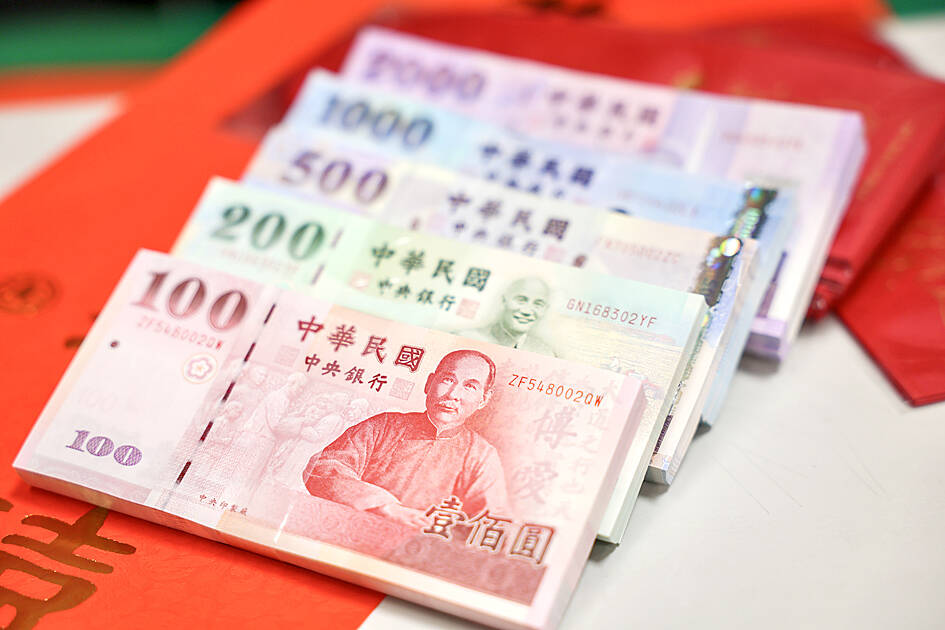Average regular wages last year reached NT$46,450 (US$1,421) per month, a 2.77 percent increase, the biggest rise in 25 years, while average total wages, including bonuses and overtime pay, climbed 4.39 percent to NT$60,984, the biggest jump in 14 years, the Directorate-General of Budget, Accounting and Statistics (DGBAS) said in a report yesterday.
The manufacturing industry, which hired most workers, was the main wage growth driver, as local tech firms benefited from the boom in demand for electronics used in artificial intelligence, DGBAS Census Department Deputy Director Tan Wen-ling (譚文玲) said.
After adjusting for inflation, real regular wages rose 0.58 percent, the best in four years, while real total wages saw a 2.16 percent uptick, the fastest in six years, the statistics agency said.

Photo: CNA
Median wages, a better gauge of typical regular pay, as it is not skewed by extremely high or low wages, was NT$37,274, rising 3.29 percent from the previous year, it said.
By sector, financial and insurance companies recorded the strongest increase at 5.44 percent in take-home pay, as they improved operational and financial performances, and distributed higher bonuses, the report said.
Firms in transportation and warehousing, and wholesale and retail also saw sizeable gains of 3.56 percent and 3.44 percent respectively, it said.
In terms of total monthly compensation, financial and insurance companies topped the ranking, with their wages rising 9.27 percent to NT$107,348.
Meanwhile, total wages for electronic component suppliers recorded a 7.88 percent pickup above the NT$100,000 mark, the report said.
Total compensation at airlines saw a solid 5.4 percent rise to NT$65,305 per month, as Taiwanese like to travel abroad, Tan said, adding that workers at domestic shipping companies also received generous compensations, although they increased less than they did in 2023.
On the other hand, low-paying companies included restaurants and hotels, with monthly pay of NT$34,322, and hairdressers at NT$35,811, the agency said.
Restaurants and hotels also had the lowest median monthly wages at NT$30,960 and NT$31,441 respectively, as they keep relatively high ratios of part-timers, it added.
At the same time, the number of workers hired by the industrial and service sectors stood at 8.45 million last year, representing a 0.41 percent increase, or 34,000 people, from a year earlier, the agency said.
Service providers raised their headcounts by 1.04 percent, while manufacturers shrank their payroll by 0.5 percent, as non-tech sectors in Taiwan took a hit from China’s overproduction and sluggish market demand.

Sweeping policy changes under US Secretary of Health and Human Services Robert F. Kennedy Jr are having a chilling effect on vaccine makers as anti-vaccine rhetoric has turned into concrete changes in inoculation schedules and recommendations, investors and executives said. The administration of US President Donald Trump has in the past year upended vaccine recommendations, with the country last month ending its longstanding guidance that all children receive inoculations against flu, hepatitis A and other diseases. The unprecedented changes have led to diminished vaccine usage, hurt the investment case for some biotechs, and created a drag that would likely dent revenues and

Macronix International Co (旺宏), the world’s biggest NOR flash memory supplier, yesterday said it would spend NT$22 billion (US$699.1 million) on capacity expansion this year to increase its production of mid-to-low-density memory chips as the world’s major memorychip suppliers are phasing out the market. The company said its planned capital expenditures are about 11 times higher than the NT$1.8 billion it spent on new facilities and equipment last year. A majority of this year’s outlay would be allocated to step up capacity of multi-level cell (MLC) NAND flash memory chips, which are used in embedded multimedia cards (eMMC), a managed

CULPRITS: Factors that affected the slip included falling global crude oil prices, wait-and-see consumer attitudes due to US tariffs and a different Lunar New Year holiday schedule Taiwan’s retail sales ended a nine-year growth streak last year, slipping 0.2 percent from a year earlier as uncertainty over US tariff policies affected demand for durable goods, data released on Friday by the Ministry of Economic Affairs showed. Last year’s retail sales totaled NT$4.84 trillion (US$153.27 billion), down about NT$9.5 billion, or 0.2 percent, from 2024. Despite the decline, the figure was still the second-highest annual sales total on record. Ministry statistics department deputy head Chen Yu-fang (陳玉芳) said sales of cars, motorcycles and related products, which accounted for 17.4 percent of total retail rales last year, fell NT$68.1 billion, or

In the wake of strong global demand for AI applications, Taiwan’s export-oriented economy accelerated with the composite index of economic indicators flashing the first “red” light in December for one year, indicating the economy is in booming mode, the National Development Council (NDC) said yesterday. Moreover, the index of leading indicators, which gauges the potential state of the economy over the next six months, also moved higher in December amid growing optimism over the outlook, the NDC said. In December, the index of economic indicators rose one point from a month earlier to 38, at the lower end of the “red” light.